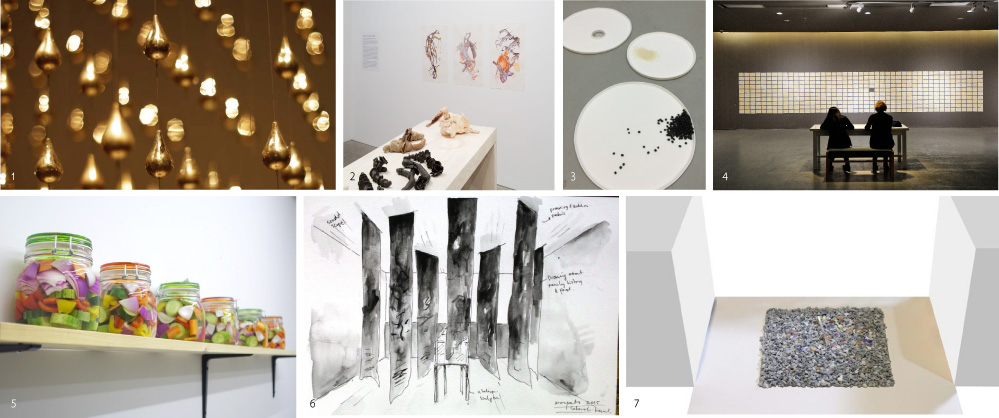Fukutake House
Asia Art Platform 2016
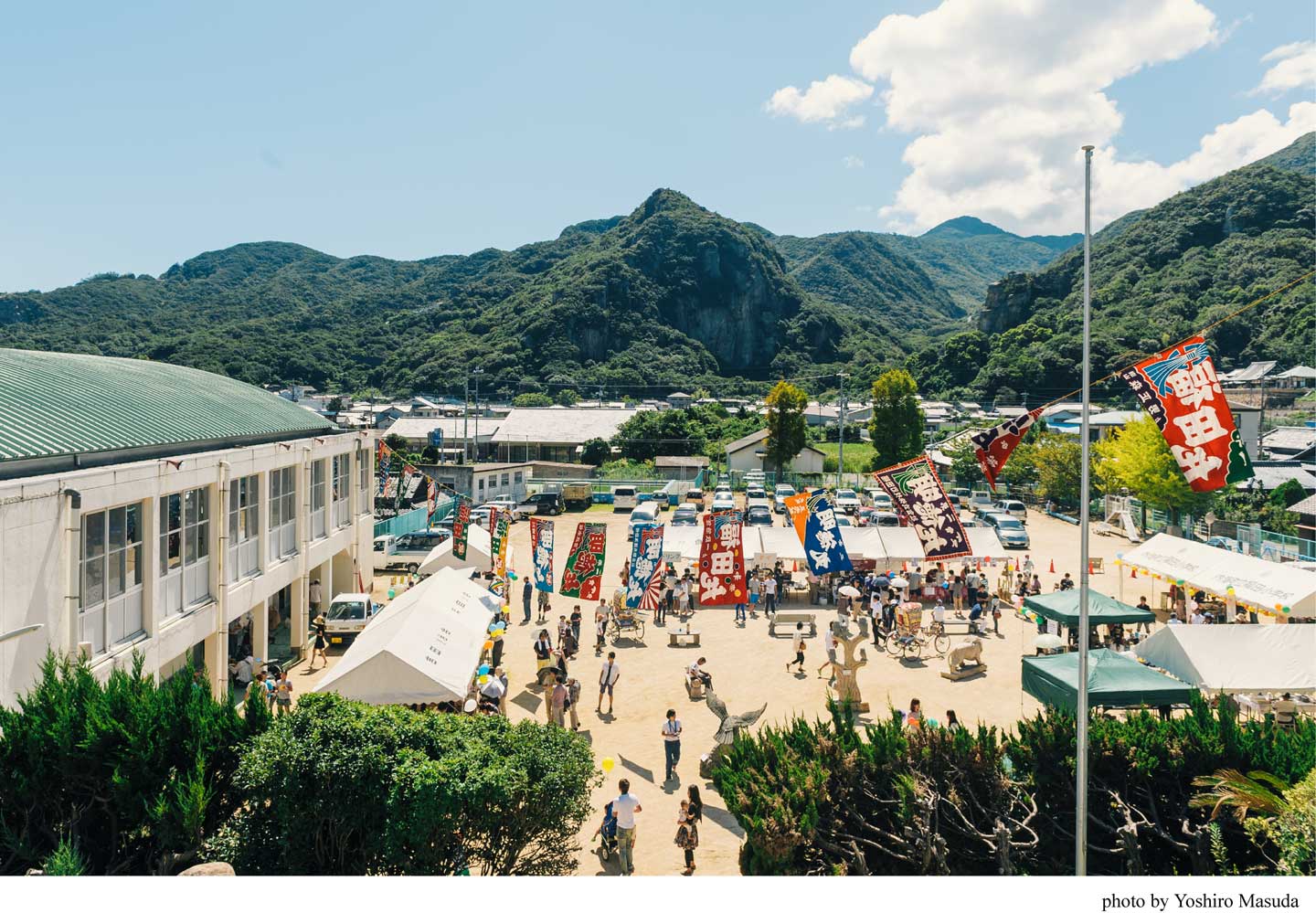
Rethinking the Role of Art through the Village Unit
This program creates connections among regions throughout Asia in a small village on Shodoshima Island. Launched during the Setouchi Triennale 2013, it aims to be a platform for Asian cultures, and for all kinds of people, to interact with one another through art. While serving as a forum for various practices and presentations, including opportunities for artists and organizations that are deeply involved and active in local communities all over Asia to engage with each other, the program acts as an open platform that expands the scope of mutual exchange-based activities.
Currently, the various regions of Asia, while possessing their own unique traditions and cultures, are being swept by the wave of globalization as they grow economically, and are facing a range of issues. As people question the direction civilization is headed, the roles of art, as something that sparks individuals' realization that we are all connected to nature, are manifold and extremely important. We are reconsidering the role of art through the unit of the village - one that has been defined over the centuries by its specific environment and history - and gradually explore what might be achieved here in the village of Fukuda on Shodoshima Island.
Based around three main projects, Fukutake House in the restored former Fukuda Elementary School; the Fukuda Art House Project, expanding into the village; and Fukuda Asian Diner in the Fukuda Gymnasium, this program offers opportunities for regional cultural exchange, particularly through contemporary art and the foods of Fukuda and elsewhere in Asia, and showcases the charms of various parts of Asia, including this small village of Fukuda.
Sponsor: Fukutake Foundation / Shodoshima-cho / Fukuda District Autonomous Federation
General Director: Fram Kitagawa
Fukutake House
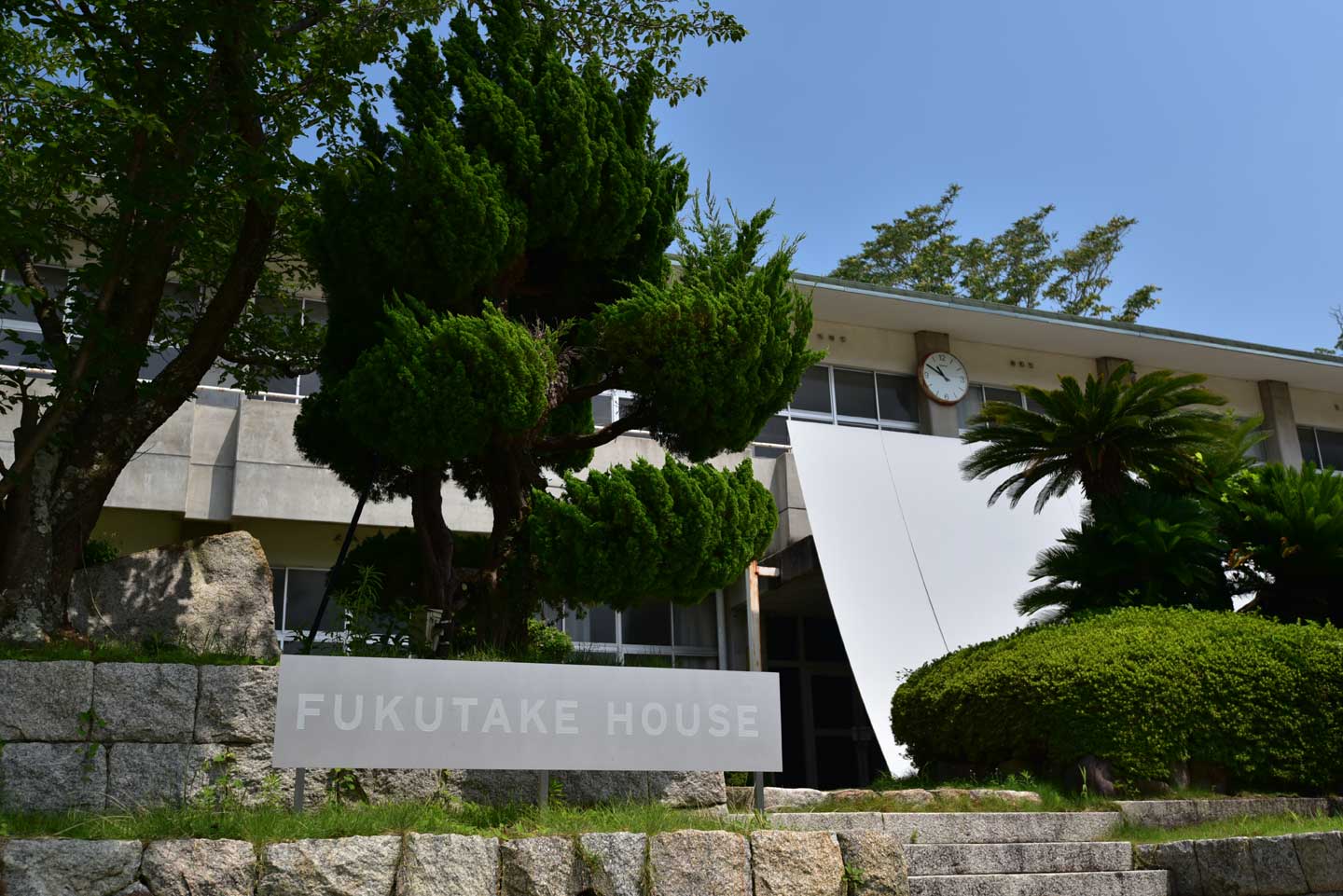
Today, as local culture and character become increasingly diluted, are we not losing much that has value? This joint exhibition, held in conjunction with partner organizations of the Fukutake House Asia Art Platform, is being organized with this crucial question in mind. Artists with different cultural backgrounds have been selected by local organizations from various parts of Asia to take up residence in a small village on an island in the Seto Island Sea, living together and engaging with each other's processes of creative production, sharing their ideas, and sympathizing with one another's perceptions of various issues, in a process eventually sublimated into messages of universal scope through their artworks.
The venue is the former Fukuda Elementary School, partly renovated by architect Ryue Nishizawa. In the future, we plan to utilize the school building as an art exhibition space and conference center.
Fukutake House Collaborative Exhibition 2016
"In Search of Balance"
Food culture is significant in Asia. One can tell a person's origin simply by his/her cooking style. Globalization, however, changed the landscape of food culture. While "fusion" cuisines become a characteristic of modern dining, especially in cosmopolitan areas, local dishes which emphasize the use of local ingredients became an essential component in the food globalization process. The FUKUTAKE HOUSE ASIA ART PLATFORM provides a time/space for artists and audience to look at the paradox of "global-localization" and study how this process is taking place across various Asian cities. To strike a balance between modernization and cultural legacy is a difficult issue.
1:Arin Rungjang(The Jim Thompson Art Center / Bangkok)
2:Naomi Eller(Asialink / Melbourne)
3:CHEUNG Wai-sze, Rachel(Hong Kong Arts center / Hong Kong)
4:Carol Lee Mei Kuen(Hong Kong Arts Center / Hong Kong)
5:Hyemin Son & John Reardon (Seoul Art Space Geumcheon / Seoul)
6:Maryanto in collaboration with Rully Isfihana(Cemeti art house / Yogyakarta)* Performer: Linda M, Rully Isfihana
7:Yun-shan Lee(Institute of Historical Resources Management / Taipei)
Space design advised by Ryue Nishizawa
Fukita Pavilion
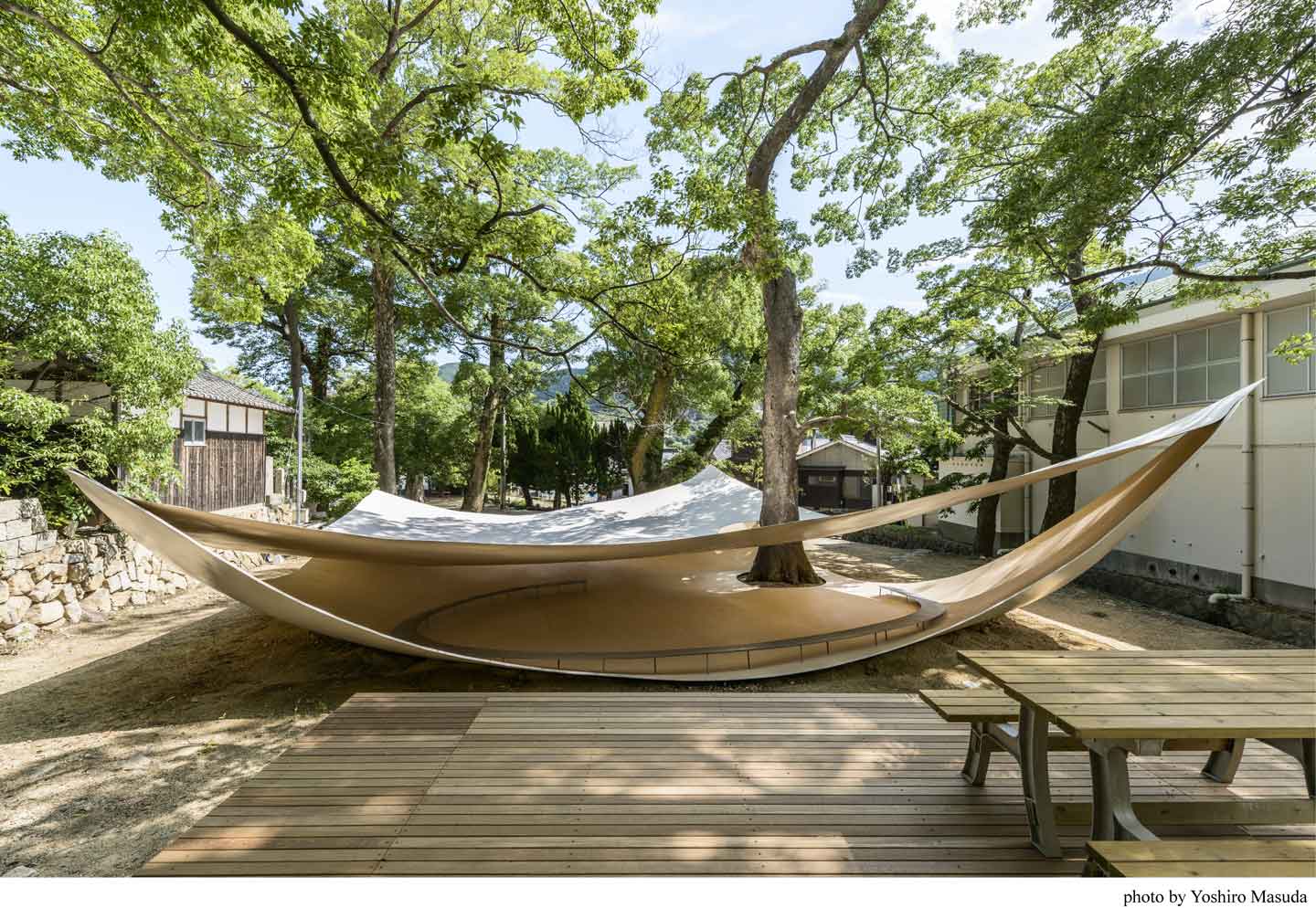
This unique pavilion is on the precincts of Fukita Hachiman Shrine, adjacent to the Fukuda Gymnasium. The space between the two large steel sheets serves both for seating and as a children's playground leading to the shrine precincts.
Like the renovated elementary school venue, the design is by Nishizawa Ryue. The two horizontally overlaid curved steel sheets are welded together at their edges in such a way that they hold each other in place, the top (roof) plate preventing the bottom (floor) plate from unfurling, while the bottom plate supports the top plate, which sags down in the middle.
Ownership: Shodoshima-cho
Fukuda Art House Project: Kyoku
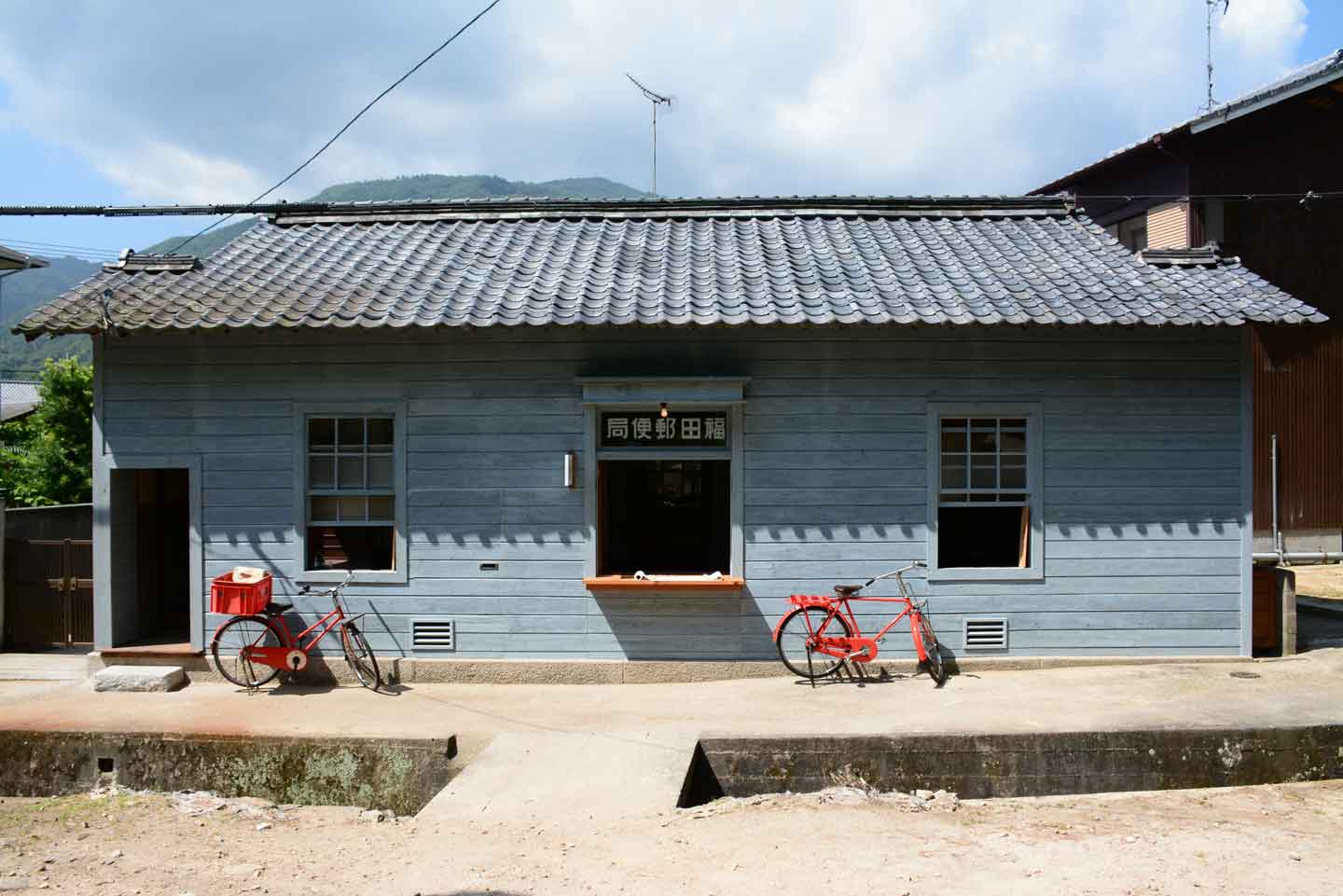
The Fukuda Art House Project extends the project based at the former elementary school out into the village, deepening visitors' understanding of the local community.
The former Fukuda Post Office, which is now an artwork, is a building filled with people's memories. At one time, this was the place at which information from the world outside Shodoshima Island arrived ashore, the gateway connecting the island to the world. The idea for this project arose out of a desire to resurrect these memories and once again connect people and the region in this building which had fallen silent in recent years.
The goal is to distill the memories of people in this community, to create a "bridge" that overcomes all manner of obstacles and links different cultures together, and to preserve and convey people's thoughts about hometown and family. Inside this former post office, visitors write down their thoughts in letters and put them into the mailbox, turning the old post office into a vessel and "distribution center" for myriad memories. In this project, the gears of Fukuda's communal memory begin to turn again, launching a new narrative that binds together past, present, and future.
Chen Xuan-Cheng/Hsu Chia-Ling, Memoryscape - Kyoku, 2015
Produced in collaboration with: Institute for Historical Resources Management, Taipei
Fukuda Asian Diner
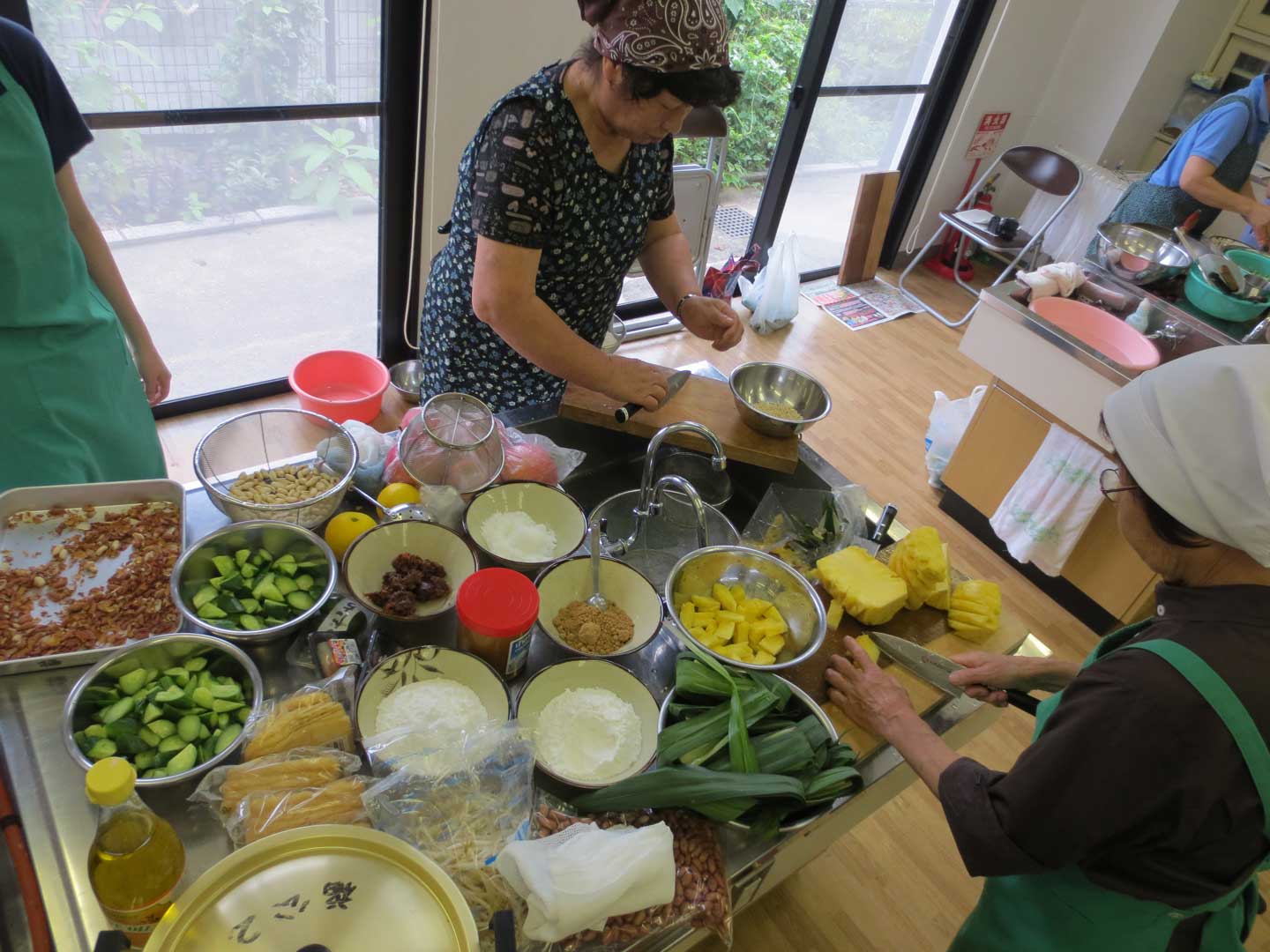
Fukuda Asian Diner opened in 2013 as a place to connect the various regions of Asia with local residents and visitors through the medium of food. Workshops are held between culinary experts invited through Fukutake House's partner organizations, and local people involved in running the cafeteria. Participants learn about each other's home cooking dishes, cooking methods and ingredients typical of their respective regions, and work together to create a menu. In addition to the menu items created during these workshops, there is a constantly evolving lineup of other dishes conceived through the imagination and originality of the diner's staff.
Fukutake House: Asia Art Meeting
Held at Fukutake House, a forum for ongoing interaction through culture in the Asian context, this symposium will be conducted in conjunction with people engaged with the arts throughout Asia, with the goal of reaffirming universal values that our contemporary society has been losing sight of. Bringing together artists and performers from all over Asia, it will create a place to interact, share current circumstances, build networks, and discuss the future.
Date: Sunday, July 24, 2016 10:00 a.m. - 3:00 p.m.
Venue: Fukutake House
Admission:JPY500
*Free for children 15 and under
*Free for Setouchi Triennale Passport holders
Fukutake House Asia Art Platform 2016
Dates:
July 18 - September 4, 2016(Setouchi Triennale 2016 summer season)
October 8 - November 6 (Setouchi Triennale 2016 autumn season)
*Additional opening during Silver Week holidays (September 17 - 25). As these dates fall outside of the official Setouchi Triennale 2016 seasons, Setouchi Triennale Passports will not be valid.
Opening Hours:
Fukutake House, Fukuda Art House Project: Kyoku | 11:00 a.m.- 5:00 p.m.
Fukuda Asian Diner | 11:00 a.m.- 4:00 p.m.
Closed:
Mondays
*Open on Monday for national holidays, but closed the next day
Admission:
JPY500
*Free for children 15 and under
*Free for Setouchi Triennale Passport holders
Venue:
718-1 kou,Fukuda,Shodoshima,Kagawa (For details, click here)
Contact:
Information about Setouchi Triennale
TEL +81-(0)87-813-2244(Takamatsu Port General Information Center)

